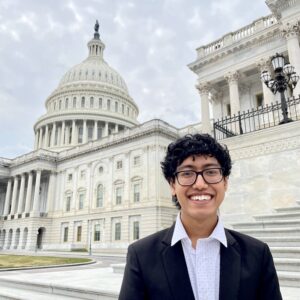Bold Ideas, Emerging Leaders: Roosevelt Network Emerging Fellows Journal 2024
August 1, 2024
In this collection of undergraduate papers, student authors from the Roosevelt Network Emerging Fellowship program engage deeply with research that embraces the intersections of policy, power, and narrative change to develop around-the-corner policy ideas that could fundamentally change their communities.
Paradigm-shifting policy work is a bit like sci-fi world-building: It requires creativity to imagine a world different from our own and to think about what would lead to making that world a reality.
Student Papers
Worker Power and Economic Security

Rebalancing Bargaining Power in New York City's Restaurants (and Beyond)
By Casey WilliamsAfter decades of declining power, the labor movement has been experiencing something of a revival in recent years. Actors and autoworkers on strike have grabbed national attention, successful organizing efforts have won union representation for baristas and Amazon workers alike, and in 2021, public support for unions reached 71 percent—its highest level since 1959 (Milkman and van der Naald 2023). As the labor movement regains prominence nationally, unions in cities and states where organized labor has managed to withstand decades of automation, deindustrialization, and economic organization have fared the best. The state of New York, where workers are unionized at twice the rate of the US national average, appears to be one such stronghold (Milkman and van der Naald 2023).
About the Author
Casey Williams graduated in May 2024 from Hampshire College, where he studied politics with concentrations in labor studies and urban studies. Inspired by his experience working in a bakery, Casey focused his Emerging Fellowship research on how to increase workers’ bargaining power in low-wage industries across New York state. He is passionate about urban development, housing policy, and the working class, and he intends to continue researching worker power. Casey hopes to pursue a career focused on rebuilding the power of the labor movement beyond the shop floor to help create an economy—and a society—that workers for workers.

Tipping the Scale: How Wage Policy Impacts Wisconsin’s Food Service Workers
By Olivia LigmanWorking in the American food service industry comes with some notorious stipulations, the most infamous of which is tipping. Tipping is currently protected and codified in both federal and state laws in the form of a two-tiered minimum wage system. Despite arguments dating back to the rise of chain restaurants and the overall increase in service jobs, tipping remains a key part of restaurant and beverage worker income. In Wisconsin, many food service workers are considered low-income, and subminimum (i.e., tipped) wages are often the main culprit.
About the Author
Olivia Ligman (she/her) was born and raised in central Wisconsin. Olivia’s passion for labor justice and policy stems from her background growing up in a largely blue-collar community with a strong work ethic and sense of determination. She is a recent graduate of the University of Wisconsin-Madison and plans to continue studying labor history at IU Bloomington while pursuing her graduate degrees.
Race and Democracy

Barriers to Democracy are Barriers to Housing: Strengthening Political Participation to Alleviate the Housing Crisis in Massachusetts
By Aryen ShresthaHousing unaffordability and racial segregation, the status quo in Massachusetts, are inextricably linked. They share the same root cause: Power is vested in unrepresentative local institutions, which shape housing policy for a privileged few rather than their communities as a whole. This state of affairs did not develop in a historical vacuum—the emergence of neoliberalism in the 1970s, which encouraged the scaling down of federal involvement in housing, left local governments with the enormous responsibility of managing housing outcomes. To increase housing affordability and improve racial equity, we must strengthen democracy at the local level by radically increasing political participation among tenants, people of color, and poorer households to ensure that the voices of all community members are heard. Empowering democracy will allow us to create a Massachusetts where all residents are able to live and thrive.
About the Author
Aryen Shrestha is a recent graduate of Amherst College, where he majored in economics. Born and raised in Kathmandu, Nepal, he is passionate about using economic research and policy analysis to help foster communities that allow everyone to thrive, with a special interest in the role of democratic institutions in inclusive development. He was awarded Amherst College’s 2024 James R. Nelson Prize for writing a “distinguished honors thesis that applies economic analysis to an important question of public policy” for his work on the impacts of municipal spending on housing affordability and racial segregation in Massachusetts. He has previously interned at the Inclusive Economies unit of the Federal Reserve Bank of Boston, focusing on researching the priorities and impacts of community development plans across New England in the wake of the COVID-19 pandemic. Aryen also worked for three years as an undergraduate research fellow at the Sustainable Policy Lab at the University of Massachusetts Amherst, where he coauthored peer-reviewed journal articles on municipal climate resiliency in Massachusetts and the cost effectiveness of nature-based solutions for reducing disaster risk across the globe. At Amherst College, he was also a student leader in the Better Amherst Initiative, an organization advocating for more institutional support for students interested in social impact careers.

Transforming Virginia through Upzoning: Using Sustainability, Population Density, and New Data to Tackle the Housing Crisis
By Lina HuntThe housing affordability crisis is nothing new to residents of the United States’ biggest cities, but lately, even small and mid-sized communities are feeling its effects. In Virginia, where residents might live in urban or rural areas, the National Low Income Housing Coalition (NLIHC) estimates that there is a shortage of over 180,000 extremely affordable and available units (NLIHC 2022). Virginians, especially Black, Latinx, and low-income renters, have very few affordable and sustainable housing options (Aurand et al. 2023). This is in part caused by the ongoing impacts of decades of institutional racism in housing policy and by the gentrification of historically affordable neighborhoods. The NLIHC estimates that 78 percent of extremely low-income renters in Virginia experience a severe cost burden, spending more than 50 percent of their monthly income on rent (Aurand et al. 2023).
About the Author
Lina Hunt works as the student program associate at the Roosevelt Institute, providing strategic program support to student fellowship programs. Prior to joining Roosevelt full time, Lina worked in committee operations for the Virginia House of Delegates’ 2024 legislative session. Lina was also a 2023 Roosevelt in Washington Fellow at the Roosevelt Network. They earned a BA in economics from William & Mary in January 2024.
Corporate Power

Reregulating Utilities and Energy Markets to Promote Public Power and Energy Democracy in Northern California: The Case of PG&E
By Catherine TongAmid constant reports of environmental disasters such as the Flint Water Crisis and California’s endless wildfires, it is widely agreed that infrastructure ranging from roads to energy to dams in the United States is broadly unreliable, outdated, and not well-maintained. Transmission lines in the US, for example, were constructed shortly after World War II and have not received substantial updates since then (Blunt 2022).
About the Author
Catherine Tong (they/them) is a student at the University of California, Berkeley studying comparative literature. Catherine is committed to gaining an interdisciplinary education: They are learning two different languages, took part in a cybersecurity graduate seminar, and completed courses in medical anthropology, biostatistics/R, and more. As a non-binary Chinese American, they are deeply committed to uplifting the marginalized and underrepresented. They continue to teach and volunteer for Speech & Debate: Global Citizenship, a program they founded as a high school junior that has won national recognition for teaching over 100 3rd–5th graders about stigmatized social justice issues. At Cal, Catherine is a student researcher at Berkeley Law’s MacArthur Award–winning Human Rights Center, investigating worldwide human rights violations and atrocities. They also work to promote inclusion, awareness, and celebration of queer folx on campus, having conducted a semester-long ethnographic research project on LGBTQ+ student affairs and interned for UC Berkeley’s Gender Equity Resource Center. In their personal time, Catherine enjoys reading (49 books in 2023), indoor rock climbing, and visiting museums.

Navigating Data Privacy: Addressing Big Tech’s Power under the California Consumer Privacy Act
By Evelyn De La CruzCalifornia’s Silicon Valley has, in many regards, become the global epicenter of technological prowess. An abundance of products, services, and—above all—ideas has cemented the region’s companies as modern marvels of innovation. Though the definition of a Big Tech company can be difficult to pinpoint, the term is often used in reference to companies whose market indexes are considered to be the largest in wealth and scale—Google (whose parent company is Alphabet), Amazon, Microsoft, Meta (formerly known as Facebook), and Apple. Collectively, these companies “total more than the entire economy of the United Kingdom” (O’Mara 2019).
About the Author
Evelyn De La Cruz, a recent graduate of the University of California, Irvine, majored in business economics and digital information systems to enhance her exploration of data privacy issues. She became interested in data privacy after working with the Women’s March Foundation, where she gained firsthand exposure to the importance of safeguarding individuals’ personal information. Throughout her academic journey she actively engaged in extracurricular activities, serving as a government relations aide for her school government, ASUCI, and as a director for the UCI Student Alumni Association. Additionally, her role as an advisory member for LA Repair underscored her commitment to community engagement and advocacy. Her professional experiences, including internships at JP Morgan as a corporate and investment banking intern and with the Democratic National Committee as an analytics engineering intern, equipped her with valuable insights into the intersection of technology, business, and policymaking. With this multifaceted background, Evelyn brings a unique perspective to her analysis of data privacy concerns as they pertain to big tech monopolies and the California Consumer Privacy Act (CCPA).
Climate and Economic Transformation

Rebuild or Rethink: Seattle’s Opportunity to Combat the Legacy of Urban Highways
By Henry MeansThe 1956 Federal-Aid Highway Act (FAHA) forever changed the landscape of American transportation. The historic investment in US infrastructure was designed to connect the nation’s cities, suburbs, and rural towns to promote economic growth and facilitate military mobility during potential times of war. Despite the interstate network’s successes, as a country, we are just starting to fully recognize the entire scope of consequences of these infrastructure decisions. Like many legislative ventures of the postwar era, the FAHA further reinforced the racialized economic inequality and geographic segregation of Jim Crow policies in cities north and south. Localities and state highway departments received funding from the FAHA but lacked the land needed to build useful and expansive highway networks. The acquisition of this land and the planned routes became an inherently political process that further reinforced the systemic racism of the time.
About the Author
Henry Means is a recent graduate of the University of Wisconsin-Madison, where he studied political science, Spanish, and public policy. During his time at UW-Madison, Henry’s classes inspired passions in local governance, climate justice, and housing and land use policy. Henry has spent time interning for a state legislator, a policy research firm, the Department of Housing and Urban Development, and of course, the Roosevelt Institute. Currently, Henry is exploring career options related to public policy research.

Ensuring Justice and Stakeholder Engagement in Michigan's Renewable Energy Transition
By Mara PusicAs climate change continues to worsen, communities across the United States are seeing the harmful ramifications firsthand. The increase in intensity and frequency of natural disasters, flooding, and droughts is impacting marginalized communities at disproportionate rates. To protect the planet and minimize the future impact of climate change, we need to dramatically change how we produce and use electricity and embrace low-carbon renewable energy technologies. Often, renewable energy development has relied on for-profit energy companies that have little interest in investing in large-scale projects that benefit local communities. Many states are beginning to realize that bold action is needed to tackle our climate crisis and are ramping up investments in renewable energy infrastructure.
About the Author
Mara Pusic is a recent graduate of the University of Michigan – Ann Arbor, where she earned her degree in public policy with a concentration in environmental policy and sustainable development. She is passionate about issues of climate justice and has extensive experience in policy research, writing, and community engagement. Throughout her time in university she has worked on environmental policy projects as a researcher with the University of Michigan’s Graham Sustainability Scholars Program and the Ford School of Public Policy’s science, technology, and public policy Program. Mara plans to continue her work in environmental policy as a research associate based in Washington, DC.
About the Roosevelt Network
The Roosevelt Network develops and supports undergraduate college students and early career professionals—centering those who hold identities historically denied political power.